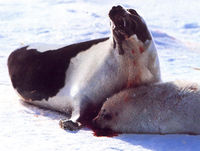Humane Society International
Humane Society International (HSI) oversees and coordinates the work of the Humane Society of the United States (HSUS) abroad by addressing animal related issues that cross boarders and impact millions of animals. HSI works with national and jurisdictional governments, humane groups and individuals worldwide for practical, culturally sensitive and long-term solutions to animal issues. HSI has worked with the United Nations, the European Union, the World Trade Organization and the parliaments of Great Britain, Germany and Australia. HSI works with policy makers, conducts briefings and assists in the drafting of legislation, regulations, policies, treaties, trade agreements and resolutions which affect animals. [1]
Contents
Current campaigns
- Animal testing
- Bulls
- Elephants
- Dog Meat
- Dolphins
- Sharks
- Hens
- Seals
- Pigs & Cattle
- Puppy Mills
- Sharks
- Whales
- Wildlife
Selected campaigns
Asian imports: dog & cat fur
Over two million dogs and cats are slaughtered each year for their furs and skins, mostly in China and other Asian countries. China produces 85% of the world's fur and has no animal welfare laws. A Swiss Animal Protection Agency documented the slaughter of millions of dogs and cats being bludgeoned, hanged, bled to death, and strangled with wire nooses. Investigators documented 50,000 to 100,000 cat pelts stockpiled at animal byproduct factories in China. At least ten dogs are slaughtered to make a single coat, more if puppies are used. Up to 24 cats are slaughtered to make one fur coat. Dog and cat fur is used in trims, linings, hats, decorative figurines, and folk remedies. Skins are used in dog chew toys and shoe leather. Since 1997, the Humane Society of the U.S. and the Humane Society International have investigated the international fur trade from Asian countries to wholesalers in the U.S., Russia and the European Union. In the Asian fur trade, cats are strangled inside their cages as other cats look on. Dogs are noosed about the neck by metal wires and then slashed across the groin. The wire noose cuts into their throats as they struggle before losing consciousness. In Harbin China, investigators from HSI documented a German shepherd still blinking and conscious as he was being skinned. Although dog and cat fur is banned in the U.S., the "U.S. Fur Products Labeling Act" exempts products $150.00 and under (the price range for fur trimmed garments and accessories). [3], [4] See also War on Animals, section 5 on animals used for clothing.
Canadian seal hunts
Canada's annual seal hunt is the largest commercial hunt of marine mammals on the planet. Canadian regulations stipulate that hunters may kill seals with wooden clubs, hakapiks (ice picks) or guns. Each method is demonstrably cruel. In areas where hunters shoot from moving boats, pups are often only wounded. Also, Canada's main sealskin processing plant deducts $2 from the price for each bullet hole, so hunters do not like to shoot seals more than once. As a result, wounded seals are left to suffer in agony or slip beneath the surface and drown. [5] Rebecca Aldworth is Director of HSI, Canada. She has been a first hand observer of Canada's commercial seal hunt and has escorted over 100 scientists, parliamentarians and journalists to witness the slaughter. On June 15th, Canada’s 2009 commercial seal slaughter came to an end. Over 72,000 defenseless baby harp seals were killed, almost all of them just weeks of age. [6]
Canadian seafood boycott
The Protect Seals Network is sponsored by the HSUS and HSI. Participating organizations represent tens of millions world wide that oppose Canadian seal hunts. Over 5,000 restaurants and grocery stores have joined campaign to boycott Canadian Seafood; including Whole Foods Markets, Ted's Montana Grill, Trader Joe's, BI-LO, WinCo Foods, Harris Teeter, Fresh Market, Oceanaire Seafood Room, Bon Appetit Management Company and Jimmy Buffett's Margaritaville Cafes. [7]
Personnel
- Andrew Rowan, President & Chief Executive Officer
- Kitty Block, Vice President
- Marta Prado, Executive Director, International Trade and Development
- Susan Prolman, Director of campaigns
- Teresa Telecky, Director of policy
- Naomi Rose, Senior Scientist
- Kelly O'Meara, Director of programs
- Toby Bloom, Director, Wildlife Ecotourism (trade and development)
Contact
Humane Society International
2100 L Street, NW
Washington, DC 20037 USA
Phone: 301-258-3010
Fax: 301-258-3082
[8]
Web address: http://www.hsus.org/hsi/
HSI's European office is based in the United Kingdom. HSI maintains offices and programs in Canada, India, Costa Rica, Australia. [9]
Articles & sources
SourceWatch articles
- Animal testing
- Christine Wolf
- Humane Movement
- Humane Society of the United States
- Patricia Forkan
- War on Animals
- Wayne Pacelle
References
- ↑ About Us, Humane Society International, accessed May 2009
- ↑ Current Campaigns, HSI, June 2009
- ↑ The Price of Fur: You May not know This!, Anti-fur Society, accessed July 2009
- ↑ European Union Ban on Dog and Cat Fur, HSI, accessed June 2009
- ↑ About the Canadian Seal Hunt, HSUS, accessed July 2009
- ↑ Rebecca Aldworth Stop Canadas Cruel Seal Hunt: The Beginning of the End, HSI, June 2009
- ↑ The Protect Seals Network, HSUS, accessed July 2009
- ↑ HSI Headquarters, HSI, May 2009
- ↑ Offices and Staff, accessed June 2009
